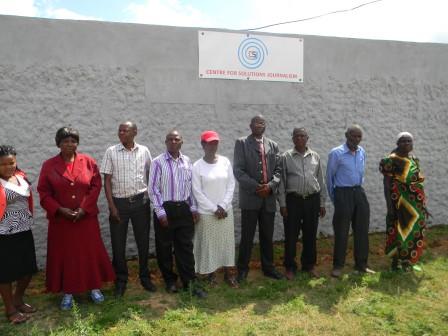
CHIRADZULU, Malawi – Traditional chiefs and village heads have an important role to play in ensuring that their subjects enjoy comprehensive sexual and reproductive health and rights, a human rights media organization has said.
Centre for Solutions Journalism (CSJ) executive director Brian Ligomeka said this at the end of a day-long training for village heads from Yasini in southern Malawi’s district of Chiradzulu.
CSJ organized the training with the aim of empowering traditional leaders as Sexual and Reproductive Health and Rights (SRHR) champions in their areas.
According to CSJ executive director Brian Ligomeka, it was important to empower the village heads with knowledge because in many rural areas, sexual and reproductive health and rights (SRHR) are not protected, promoted and fulfilled.
“The many manifestations of this lack of SRHR are well-known. The manifestations include a high rate of unplanned and unwanted pregnancies, unsafe abortions, high maternal mortality and morbidity, and the spread of the HIV-epidemic,” Ligomeka said.
Ligomeka said in most rural areas, failure to address SRHR problems resulted in the suffering of individuals, families and societies.
“Sexual Reproductive Health and Rights are human rights. It is important to realise that the right to the highest attainable standard of health includes sexual and reproductive health. When it comes to reproductive rights, freedom of choice is paramount.
“In this day and age of land and food scarcity, it is important for you traditional leaders to teach your subjects at every opportune time on the importance of girl child education, family planning through use of contraceptives and even on the need for the government to reform abortion law, so that women and girls are able to access comprehensive sexual and reproductive health services” he said.
Speaking during the training, Group Village Headman Mkwanda from the district said following the training they underwent, they will serve as dedicated SHRH champions in their areas of jurisdiction.
“We appreciate the importance of family planning and reproductive health. We fully support the need to curb population increase and enhance the overall wellbeing of the country. It is true that family planning enables women to delay their first pregnancy and space later pregnancies at the safest intervals….From my own experience in my village, women who delay childbirth have more opportunities for education and employment,” he said.
At national level, the Malawi Government is also advocating for the use of family planning.
Malawi’s Health Minister Atupele Muluzi recently urged Malawians to embrace family planning as part of a strategy to arrest high population growth and reduce maternal mortality.
“Health experts observed that low use of family planning methods results in high risk and unsafe pregnancies. Pregnancies that come early and or too frequent have resulted in high levels maternal and neonatal mortality our country. Maternal mortality has declined to 439 per 100,000 live births, but that is still too high,” said Muluzi.
Muluzi said while at the moment the population is estimated at 17.2 million, it is projected to increase to 43.1 million by 2050.
He bemoaned the increase in teenage pregnancy rate from 26 percent in 2010 to 29 percent in 2016.
Meanwhile in July this year, the Government of Malawi updated its commitment at the Family Planning Summit in London, on July 11 this year.
Malawi has committed to ensuring universal access to, and coverage of, sexual reproductive health and rights information and services, with specific focus on all adolescent and young people through promoting wider method mix choice.
Malawi has further committed to reducing teenage pregnancies by 5 percent per annum through 2030.
“This will be done through ending child and early forced marriages and ensuring that girls complete their secondary education to safeguard young people in anticipating better youth participation necessary for harnessing the Demographic Dividend. Likewise, Malawi is committed to increasing the budgetary allocation for family planning commodities, and Family Planning and youth programming,” reads part of Malawi’s commitment.
Last year (in 2016) over 455,000 women in Malawi were using a modern method of contraception which assisted in preventing 532,000 unintended pregnancies and 158,000 unsafe abortions.
Malawi Government has committed herself to providing comprehensive and integrated Sexual and Reproductive Health services in line with many international obligations.
The southern African nation is a signatory of the African Union Maputo Plan of Action which advocates for integrated SRHR Plan.
On continental level, the uptake of family planning in Africa is only 33 percent, which is almost half the world average of 64 percent.
Several studies indicate that low contraceptive use is usually due to several factors which include poverty, low female literacy rates, cultural values on misconceptions of family planning, lack of spousal or partner approval, lack of women autonomy in decision making on reproductive health, and inaccessibility of health services.
The global organisation, Family Planning, proposed a target of getting 120 million women and girls on contraceptives by 2020.
